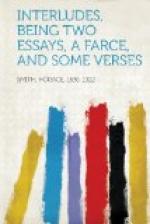The effect of habits of luxury upon the brute creation is easily seen. How dreadfully the harmless necessary cat deteriorates when it is over-fed and over-warmed. It may, for all I know, become more humane, but it becomes absolutely unfit to get its own living. What is more despicable than a lady’s lap-dog, grown fat and good for nothing, and only able to eat macaroons! Even worms, according to Darwin, when constantly fed on delicacies, become indolent and lose all their cunning.
I will note next that habits of self-indulgence render us careless of the misfortunes of others. Nero was fiddling when Rome was burning. And upon the other hand privations make us regardful of others. In Bulwer’s Parisians two luxurious bachelors in the siege of Paris, one of whom has just missed his favourite dog, sit down to a meagre repast, on what might be fowl or rabbit; and the master of the lost dog, after finishing his meal, says with a sigh, “Ah, poor Dido, how she would have enjoyed those bones!” Probably she would have done so, in case they had not been her own. Of course we all know Goldsmith’s Deserted Village, and that it is all about luxury. It is, however, very poetical poetry (if I may say so), and I don’t know that it gives much assistance to a sober, prosaic view of the subject like the present. “O Luxury, thou curst by heaven’s decree,” sounds very grand; but I have not the least idea what it means. The pictures drawn in the poem of simple rural pleasures, and of gaudy city delights, are very pleasing; and the moral drawn from it all, viz., that nations sunk in luxury are hastening to decay, may be true enough; but what strikes one most is that, if Goldsmith thought that England was hastening to decay when he wrote, what would he think if he were alive now.
Well then, if the pleasures of luxury bring nothing but pain and trouble in the pursuit of them, to what end do they lead?
“Behold what blessings wealth
to life can lend,
And see what comfort it affords
our end.
In the worst inn’s worst room,
with mat half hung,
The floors of plaister, and the
walls of dung;
On once a flock-bed, but repaired
with straw,
With tape-ty’d curtains never
meant to draw;
The George and Garter dangling from
that bed,
Where tawdry yellow strove with
dirty red;—
Great Villers lies—alas,
how changed from him,
That life of pleasure and that soul
of whim.
Gallant and gay in Clieveden’s
proud alcove,
The bower of wanton Shrewsbury and
love;
No wit to flatter, left of all his
store;
No fool to laugh at, which he valued
more;
There victor of his health, of fortune,
friends,
And fame; this lord of useless thousands
ends.”




